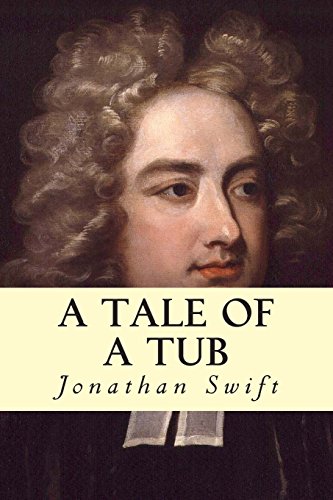Articles liés à A Tale of a Tub

L'édition de cet ISBN n'est malheureusement plus disponible.
Afficher les exemplaires de cette édition ISBN
Présentation de l'éditeur :
A Tale of a Tub was the first major work written by Jonathan Swift, arguably his most difficult satire and perhaps his most masterly. The Tale is a prose parody divided into sections each delving into the morals and ethics of the English. Composed between 1694 and 1697, it was eventually published in 1704. It was long regarded as a satire on religion, and has famously been attacked for that, starting with William Wotton.The "tale" presents a consistent satire of religious excess, while the digressions are a series of parodies of contemporary writing in literature, politics, theology, Biblical exegesis, and medicine. The overarching parody is of enthusiasm, pride, and credulity. At the time it was written, politics and religion were still closely linked in England, and the religious and political aspects of the satire can often hardly be separated. "The work made Swift notorious, and was widely misunderstood, especially by Queen Anne herself who mistook its purpose for profanity."A Tale of a Tub is divided between various forms of digression and sections of a "tale". The "tale", or narrative, is an allegory of three brothers, Peter, Martin, and Jack, as they attempt to make their way in the world. Each brother represents one of the primary branches of Christianity in the West. This part of the book is a pun on "tub", which Alexander Pope says was a common term for a Dissenter's pulpit, and a reference to Swift's own position as a clergyman. Peter (named for Saint Peter) stands in for the Roman Catholic Church. Jack (named for John Calvin, but whom Swift also connects to "Jack of Leyden") represents the various dissenting Protestant churches such as Baptists, Presbyterians, Quakers, Congregationalists and Anabaptists. The third brother, middle born and middle standing, is Martin (named for Martin Luther), whom Swift uses to represent the 'via media' of the Church of England.[4] The brothers have inherited three wonderfully satisfactory coats (representing religious practice) by their father (representing God), and they have his will (representing the Bible) to guide them. Although the will says that the brothers are forbidden from making any changes to their coats, they do nearly nothing but alter their coats from the start. In as much as the will represents the Bible and the coat represents the practice of Christianity, the allegory of the narrative is supposed to be an apology for the Anglican church's refusal to alter its practice in accordance with Puritan demands and its continued resistance to ally with the Roman church.From its opening (once past the prolegomena, which comprises the first three sections), the book alternates between Digression and Tale. However, the digressions overwhelm the narrative, both in their length and in the forcefulness and imaginativeness of writing. Furthermore, after Chapter X (the commonly anthologised "Digression on Madness"), the labels for the sections are incorrect. Sections then called "Tale" are Digressions, and those called "Digression" are also Digressions.A Tale of a Tub is an enormous parody with a number of smaller parodies within it. Many critics have followed Swift's biographer Irvin Ehrenpreis in arguing that there is no single, consistent narrator in the work.[7] One difficulty with this position, however, is that if there is no single character posing as the author, then it is at least clear that nearly all of the "personae" employed by Swift for the parodies are so much alike that they function as a single identity. In general, whether a modern reader would view the book as consisting of dozens of impersonations or a single one, Swift writes the Tale through the pose of a Modern or New Man. See the abridged discussion of the "Ancients and Moderns", below, for more on the nature of the "modern man" in Swift's day.
Biographie de l'auteur :
Jonathan Swift (1667 - 1745) was an Anglo - Irish satirist, political pamphleteer, essayist, poet, and cleric. He was born in Dublin and attended the Trinity College, Dublin. Swift earned a Master's Degree from Hertford College, Oxford University in 1692. Swift is regarded as agreat master of English prose and an impassioned satirist of human folly and pretension. He is best remembered for his prose satires and Gulliver's Travels (1726) and A Tale of a Tub (1704).
Les informations fournies dans la section « A propos du livre » peuvent faire référence à une autre édition de ce titre.
- ÉditeurCreateSpace Independent Publishing Platform
- Date d'édition2014
- ISBN 10 1502335298
- ISBN 13 9781502335296
- ReliureBroché
- Nombre de pages118
- Evaluation vendeur
Acheter neuf
En savoir plus sur cette édition
EUR 16,78
Frais de port :
EUR 11,76
De Royaume-Uni vers Etats-Unis
Meilleurs résultats de recherche sur AbeBooks
A Tale of a Tub
Edité par
Createspace Independent Pub
(2014)
ISBN 10 : 1502335298
ISBN 13 : 9781502335296
Neuf
Paperback
Quantité disponible : 1
Vendeur :
Evaluation vendeur
Description du livre Paperback. Etat : Brand New. 118 pages. 9.00x6.00x0.27 inches. In Stock. This item is printed on demand. N° de réf. du vendeur 1502335298
Acheter neuf
EUR 16,78
Autre devise

